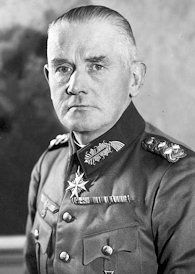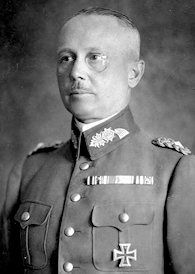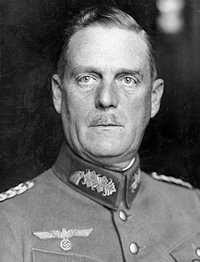![]()

Hitler Becomes Army Commander
A few days before Christmas in 1937, Adolf Hitler attended the funeral of General Erich Ludendorff, the famed World War I military leader and one-time Nazi supporter. At the memorial service Hitler chose not to speak, not wanting to utter any words of praise for a man who had come to despise him.
Ludendorff had participated in the failed Beer Hall Putsch fourteen years earlier and never forgave Hitler for scooting away amid the gunfire that erupted. When President Paul von Hindenburg appointed Hitler as Chancellor of Germany in 1933, Ludendorff sent Hindenburg a telegram saying he had just "handed over our sacred German Fatherland to one of the greatest demagogues of all time. I prophesy to you this evil man will plunge our Reich into the abyss and will inflict immeasurable woe on our nation..."
Ludendorff, along with Germany's other senior generals were men of the old school, born into aristocratic Prussian families with long military traditions, knowing even in childhood they would one day command battalions of soldiers just as their fathers and grandfathers had.
ADVERTISEMENT Among this closed society, Adolf Hitler would always be an outsider, the man referred to by Hindenburg as the "Austrian corporal." Although the Führer might be admired by millions, he would never be fully accepted by the upper echelons of his own General Staff. Hitler, of course, knew where he stood with them and he tolerated their quiet disdain as long as they remained useful to him.
However, by the beginning of 1938, it seemed the old-school generals lacked the nerve to go along with the Führer's ambitious plans to grab more living space for the German people. During the risky march into the Rhineland a few years earlier they had repeatedly urged Hitler to withdraw his troops out of fear the French might attack. Both during and after the Hossbach conference, in which Hitler first revealed his war plans, they expressed great fear that the quest for Lebensraum would plunge Germany into a new European war with catastrophic consequences.
But Hitler didn't care about consequences. He was only interested in results. And any attempts to get him to change his mind were a complete waste of time. The generals didn't realize they were dealing with a man who never changed his mind once he made a firm decision and would do anything to achieve a desired goal.
For Hitler, the moment had arrived to clean house, to replace the crusty old generals with younger men eager to serve their Führer and follow orders, regardless of the consequences. The two highest ranking officers in Germany at this time were holdovers from the days of President Hindenburg; Field Marshal Werner von Blomberg, the Commander-in-Chief of the German Armed Forces, and General Werner von Fritsch, the Commander-in-Chief of the Army. These stiff-lipped men with their rigid codes of honor were about to be toppled by that most vile of all things from their point of view, personal scandals involving sex.
Better days for Field Marshal Blomberg (2nd from right) - a parade in March 1937 honoring his 40th year of service in the Army, attended by Göring, Raeder, and Fritsch. Below: Portraits of the two men whose long military careers were abruptly ended by Nazi intrigue. Blomberg (left) and Fritsch. Blomberg was the first to fall. He was a lonely widower in his sixties whose first wife had died in 1932. He fell in love with and subsequently proposed to his secretary, a Fräulein half his age named Erna Gruhn. However, since she was from a lowly working class background, Blomberg worried over how such a marriage would be received among his peers. He decided to ask Hermann Göring for his opinion and was duly relieved when Göring said there would be no problem. After all, Göring told him, he had married a divorced actress himself.
And so the wedding took place on January 12, 1938. It was a private ceremony held in the War Ministry building witnessed by both Göring and Hitler. The happy newlyweds then departed for a honeymoon in Italy. But while they were away, all kinds of nasty rumors began to surface about the bride's past. In Berlin, a police file was soon discovered bearing her name and was brought to the attention of Berlin's police chief, Graf von Helldorf.
Helldorf, a former Army officer himself, decided to bring it to General Wilhelm Keitel. However, Keitel promptly informed him that he had no desire to get involved in such matters and suggested that he bring the file to Göring instead, which Helldorf did.
Göring read the file and was absolutely delighted to learn that the new wife of the Commander-in-Chief of the German Armed Forces had a police record as a prostitute and had also posed for porno photos, which were included in the file. Göring knew this would mean the end of Blomberg's career, with the possibility that he might succeed him. Thus he brought the file to Hitler on January 25th and stood back as the Führer exploded with rage at having been a witness at the marriage of an ex-prostitute.
Now it was time to confront Blomberg, who had just returned to Berlin. Göring rushed off to see him at his office. Blomberg, up to this point, had absolutely no idea as to what was happening. Upon hearing the shocking news, Blomberg immediately offered to get a divorce to save his career. Göring told him a divorce would never do since he had shamed the entire officer class.
Later that day, Hitler summoned Blomberg to the Reich Chancellery and promptly sacked him, after promising that he would restore him to duty when the controversy faded. Blomberg went back to Italy and resumed an extended honeymoon with his now-scandalized bride, then retired to a village in Bavaria. He was never recalled to service by Hitler. And despite all that happened, he stayed loyal to his wife till the end.
The Blomberg scandal was mild compared to the next one, a frame-up by Himmler and Heydrich that toppled General Werner von Fritsch, Commander-in-Chief of the Army. Fritsch was known to have a contemptuous attitude toward Himmler and his black-coated SS. Himmler thus looked for any opportunity to humble this proud member of the officer corps. Himmler was aided in his treachery by Göring who hoped to benefit from Fritsch's downfall.
On the same day that Blomberg had been ruined, Göring had given Hitler a Gestapo file provided by Himmler and Heydrich. The file told a sordid tale of General Fritsch, a life-long bachelor, engaging in homosexual conduct in a back alley in 1935. Supposedly, an ex-convict, who specialized in spying on illicit sex acts and blackmailing the participants, had witnessed Fritsch during a tryst at a Berlin train station. According to the file, he blackmailed Fritsch for years afterward.
When the file was shown to Hitler, his military adjutant, Colonel Friedrich Hossbach, happened to be present. Out of Army loyalty, he rushed off to tell General Fritsch, despite being warned by Hitler not to discuss the matter with anyone. Fritsch, upon being hearing the allegations, flatly denied everything.
The next morning, Hossbach courageously told Hitler about his discussion with Fritsch and repeated the general's strong denial. Hossbach also urged Hitler to give Fritsch a private hearing with a chance to clear his name. Surprisingly, Hitler agreed, and Fritsch was summoned to the Chancellery.
Fritsch arrived at the meeting that evening to find Himmler and Göring already there waiting for him. Hitler then recited the sex-blackmail allegations and gave Fritsch an opportunity to respond. Fritsch once again denied everything.
But now, Himmler confronted Fritsch with a surprise witness, the blackmailer himself, a disreputable character named Hans Schmidt who proceeded to contradict Fritsch, claiming that he recognized Fritsch as the officer he had seen in the back alley at the train station. Schmidt also claimed he had successfully blackmailed Fritsch since that night.
General Fritsch was so overcome by this bizarre turn of events that he was unable to utter a single word, which Hitler took as a sign of guilt. Hitler then asked him to resign on the spot. But Fritsch, after regaining his composure and his pride, refused outright. Instead he demanded a trial by a military court of honor. Hitler responded to this by placing him on indefinite leave.
A preliminary Army court of inquiry quickly uncovered the true story behind the frame-up. Schmidt, the blackmailer, had indeed caught an Army officer having sex at the train station, but the officer had been named Frisch, not Fritsch, and was a now-retired cavalry man. The blackmailer had been pressured under threat of death by Heydrich's agents to frame General Fritsch.
Meanwhile, rumors surfaced in Berlin that Army leaders, outraged at the shabby treatment of their top commanders, were contemplating a move against the entire Nazi hierarchy, possibly on January 30th, the fifth anniversary of Hitler's coming to power, when the Reichstag would assemble to hear Hitler speak.
The Nazis abruptly canceled the Reichstag meeting, giving credibility to the rumors. At Gestapo headquarters there were concerns the Army might even attack the place in an attempt break the power of Himmler and Heydrich.
But in reality, the Army leaders had no plans to do anything on January 30th, partly out of fear of the consequences and also out of dogged devotion to their oath of loyalty. Hitler responded to their hesitation by seizing the opportunity to exercise his power. On February 4, 1938, he convened a meeting of his Cabinet and had them promulgate a decree stating: "From now on I take over personally the command of the whole armed forces."
Portrait of General Wilhelm Keitel who became Chief of the new OKW. He demonstrated unquestioning loyalty to Hitler for the duration - even if it involved the killing of innocent civilians. He abolished the entire War Ministry, replacing it with the new High Command of the Armed Forces (Oberkommando der Wehrmacht or OKW) headed by himself with complete control of the Army, Navy and Air Force. The nominal post of OKW chief of staff was assigned to General Keitel. To replace Fritsch as Army commander, Hitler chose General Walther von Brauchitsch.
Göring, who had hoped to command the armed forces himself, was placated with a promotion to Reich Marshal, becoming the highest ranking officer in the Reich.
To the German people, Hitler announced that Blomberg and Fritsch had both resigned "for reasons of health." Along with their dismissals, Hitler sacked sixteen senior generals including von Rundstedt, von Kluge and von Kleist. Forty-four others were reassigned. Many of them would be brought back in the years ahead in what ultimately became a revolving door policy, with generals hired and fired at will by the Führer, whenever they displeased him.
The German armed forces were now in the hands of an amateur, a self-taught strategist whose actual battlefield experience involved serving as a dispatch runner during World War I. Although he had received the Iron Cross 1st Class for bravery, Hitler failed to receive a promotion because he appeared to lack leadership potential. Military officers, with their innate understanding of men's character, didn't trust the Austrian corporal enough to make him a sergeant. Now, so many years later, they still didn't trust him, but they didn't have the nerve to oppose him.
Hitler likewise never trusted his generals, preferring to rely on his own gut instincts while surrounding himself with weak-willed yes-men such as Keitel. Hitler's hands-on style of military leadership would consist of two main habits; first, he took forever to make up his mind, constantly delaying big decisions while he waffled, even when the time element was critical; secondly, once he made up his mind, the decision became the unshakable will of the Führer, no matter how disastrous it proved to be, a fatal stubbornness that would send hundreds of thousands of German soldiers to their early graves.
Now, in the spring of 1938, most of the old conservative appointees from the Hindenburg era were unceremoniously dumped by Hitler. Along with the Army house cleaning, Foreign Minister Constantin von Neurath was replaced by Joachim Ribbentrop. Hjalmar Schacht was replaced as Minister of Economics by Walther Funk. Some diplomatic house cleaning also took place. The ambassadors in Rome, Tokyo, along with Franz von Papen in Vienna, were all relieved.
In his diary, Ulrich von Hassell, who had been ousted as ambassador to Rome, penned his recollection of comments spoken to him by the now-exonerated Fritsch. "This man, Hitler, is Germany's destiny for good and for evil. If he now goes over the abyss, which Fritsch believes he will, he will drag us all down with him. There is nothing we can do."
The future lay wide open for Hitler. The German nation and the entire armed forces were his to command. The time for Lebensraum had come. The initial target would be Austria, the first step down the path that would lead to a new world war.
Copyright © 2001 The History Place™ All Rights Reserved
![]()
NEXT SECTION - Nazis Take Austria
Triumph of Hitler Index
The History Place Main Page
Terms of use: Private home/school non-commercial, non-Internet re-usage only is allowed of any text, graphics, photos, audio clips, other electronic files or materials from The History Place.



